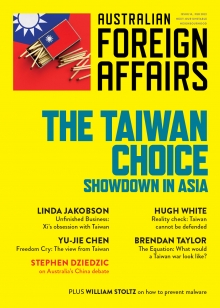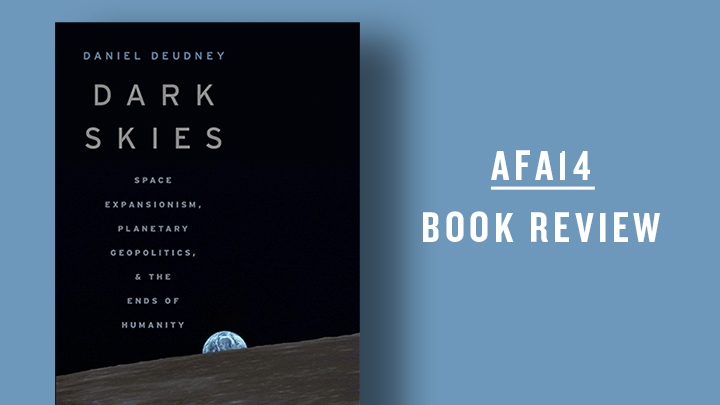
This review is featured in Australian Foreign Affairs 14: The Taiwan Choice.
To read the full issue, log in, subscribe or buy the issue.
Until recently, spacefaring had seemed a spent horizon, not a fast-approaching future.
After the 1986 Challenger disaster, even the US government lost faith in its own space evangelism, spearheaded so effectively by NASA during the Cold War. The Bush administration’s decision to pull funding from national space programs to fund the war on terror marked the end of the first long cycle for the global space industry, a cycle dominated on the supply side by Boeing, Lockheed Martin and the old guard of defence contractors.
In the early 2000s, a cluster of Silicon Valley disruptors – Jeff Bezos and Elon Musk among them – joined with seasoned space lobbyists to begin picking apart the Boeing–Lockheed duopoly. The new space entrepreneurs were by then rich enough from dotcom capital to start heavily geared side projects, with the aim of buying their way into starring roles in the Cold War space fantasies of their boyhoods. It has taken nearly twenty years to get there. With their private fortunes reinforced by public contracts – many won through aggressive anti-trust litigation and legislative lobbying – both Musk’s SpaceX and Bezos’s Blue Origin have succeeded in developing reusable rocketry, the lynchpin of the next generation of spaceflight. In doing so, they have positioned SpaceX and Blue Origin as the duopoly providers for the space economy to come.
In that time, international space law has rebounded from near-total marginalisation in the 1990s to become a stage on which pandemic-era geopolitics is playing out. The new space race superficially resembles that of the Cold War, but there are crucial differences. In contrast to the bipolar days of old, more countries are developing independent spacefaring capacity. In the last five years, China, the European Space Agency and Israel have all conducted uncrewed lunar missions, and Japan and the United States have landed probes on asteroids. Others, led by Luxembourg and the United Arab Emirates, have positioned themselves as flagship jurisdictions for future aerospace activity. While Moon to Mars and asteroid programs grab headlines, the greatest increase in space traffic is far closer to Earth. A growing list of countries, including Argentina, Brazil and South Korea, are developing the capability to operate in geostationary orbit, 35,785 kilometres above the Earth’s surface. So, too, are a horde of new aerospace corporations, Australia’s Gilmour Space Technologies among them.
In other words, earth orbit is getting very, very busy; but where all this is leading, and why, receives far less policy consideration in Australia than it deserves. Space experts have long warned that increasing congestion will exacerbate longstanding regulatory problems, from dangerous space debris to grossly unequal access to geostationary orbit. In Dark Skies, Daniel Deudney argues that the biggest regulatory problem of all remains the one that birthed the field of air and space law in the late 1940s: the risk of nuclear war. Deudney, an international relations professor at Johns Hopkins University, challenges the pervasive belief that human expansion into space is both inevitable and inherently virtuous. Drawing on work in science and technology studies, history and literary studies, he maps out a sprawling ideology he calls “space expansionism”. Within it, he identifies competing agendas: “military”, “habitat” and “planetary security” priorities all vie for policy dominance. But fuelling all pro-space agendas is a hash of techno-utopian, libertarian and messianic ideals, bound together by a pseudo-religious belief that the existential threats faced by humanity on Earth will best be solved by leaving it.
Set aside the pro-space zeal, Deudney argues, and it becomes clear that the net results of applied aerospace technology have been equivocal at best; at worst, they have aggravated the risk of nuclear war. Despite the language of “peaceful exploration” written into legal and policy instruments at domestic and international levels, Deudney insists that aerospace technology is inextricable from its military origins. The danger is self-evident: a significant proportion of global military activity already takes place in low Earth orbit via satellite surveillance, and all spacefaring states save Japan have nuclear weapons. The United States, China, India and Russia have all flexed antisatellite weapons (ASAT) capability over the last year, exploiting uncertainties in the framework of international space law. In November 2021, Russia tested ASAT weaponry on one of its defunct satellites, a dangerous act of geopolitical theatre that reportedly produced a debris field of over 1500 pieces.
Deudney concludes that if we are to avoid slouching towards a new age of mutually assured destruction, space programs the world over need to be scaled back urgently. Governments must agree to pursue programs compatible with an “Earth-centred pro-space agenda focused on nuclear and environmental security”. Orbital weapons and ballistic missiles must be relinquished en masse, and plans for lunar and Martian colonisation abandoned. The existing multilateral Outer Space Treaty framework settled in the 1960s and 1970s – which permits the use of space for “peaceful purposes” only, prohibiting national appropriation and weaponisation – must be strengthened, and the use of space for Earth system science and astronomy expanded.
Dark Skies is a sprawling critique of popular thinking on space. Explorations of the darker motivations, gross inequalities and uncontrollable consequences of space activity are hardly new – sci-fi depends on them – but are habitually dismissed by space enthusiasts as anti-liberal or nihilistic. As such, Deudney’s intervention is welcome, if only for emerging from the US international relations academy, usually a cheerleader for US military dominance. Moreover, a stripped-back, Earth-centred space agenda is, on the surface, a reasonable aspiration. But his solutions do little more than reiterate an ideal of international law as a mutually agreed restraint on sovereign power, calling for increased cooperation towards a comprehensive and stable space treaty regime. Dark Skies effectively lands us where we are now, once we escape the fumes of the space entrepreneurs: with a set of governance problems that have lurked on the global agenda for seventy years, and a beleaguered system of international diplomacy through which to address them.
Just a few short years ago, the new global space agenda was of peripheral concern in Australian policy circles. The Australian Space Agency (ASA) was established in Adelaide in 2018 within the Department of Industry, Innovation and Science, with a mandate of supporting the fledgling Australian aerospace industry to embed itself in revitalised US space-industry supply chains. As a result, the federal space agenda is largely being set by Australia’s small but staunch and fast-organising industry – and the AUKUS alliance, with its emphasis on collaborative defence investment, has only underscored that commercial logic. The space industry wants to minimise bureaucratic obstacles to space operations, and to capitalise on the money pouring into the US sector. The ASA aims to attract increased foreign investment in Australian space companies, and to build a national industry involving 30,000 jobs with a $12-billion turnover by 2030.
But ad hoc reactivity to industry lobbying will not produce a mature national space policy, and is not a substitute for developing a strategic approach to an arena of international relations that is increasing in importance. In short, the ASA, with its commercial mandate, is an insufficient answer to the question of space. The capacity of the Department of Foreign Affairs and Trade to act within the shifting landscape of space diplomacy is vital. So, too, is a coherent defence policy that does more than fall in line with US imperatives. The unglamorous details of building trust, confidence and mutual endeavour over time – the core business of international diplomacy and lawmaking – are critical to Australia’s long-term interests in space. While the entrepreneurs don their costumes, and Russia, China and the United States beat their chests, the United Nations, for all its flaws, still provides the most widely subscribed forum for negotiating new rules for space activity. Early in November 2021, the UN First Committee agreed to establish a working group to begin defining international norms for behaviour in space that mitigate the escalating risks of conflict. There will be hard work for Australian diplomats to do over the coming years, but DFAT has been starved of the resources required to maintain a strong diplomatic network, let alone in-house expertise on international space affairs.
Satellite surveillance and communications infrastructure now underpin the global economy. The notion that the commercial and military dimensions of foreign policy can be separated is as artificial in space as it is on Earth. Every Australian, along with everyone else on the planet, has a stake in space law and policy, whether the federal government acts to define and protect that stake or not. Deudney’s title is misleading: if the crowding of Earth orbit continues, the one thing the skies won’t be is dark. SpaceX’s Starlink division, a satellite internet service with plans for global coverage, intends to use every SpaceX flight to launch between sixty and 400 satellites into low-Earth orbit, with plans for up to 42,000 new satellites in the next few years. That we stand to lose the night sky to light pollution from a shroud of satellites and debris should itself be enough to send a shiver down the spine, even before we get to the risk of another nuclear age. Deudney’s conclusion is ominous, and justifiably so: “soon we will no longer be protected from the consequences of our delusions by our incapacities, and we will suffer severely unless we learn to say no.”
Cait Storr







